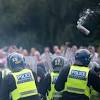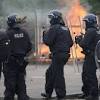What is two-tier policing
2024 - 8 - 5Two-Tier Policing: The Myth That Just Won't Die – Even When the Evidence Is Missing!
two tier policing civil unrest - conspiracy theories - Heidi Alexander - law enforcement - Mark Duggan - political rhetoric - Tommy Robinson - two-tier policing - UK riots - two tier policingIs the UK really experiencing 'two-tier policing'? Discover how this sensational myth was born and why it keeps getting resurrected!
Two-tier policing has been a buzzword in recent UK protests and riots, especially following the tragic incidents that stirred public outcry. Critics, often from the far right, claim that police treat certain groups differently depending on various social and political factors, advocating that the justice system is somehow compromised. Initially propagated by controversial figures like Tommy Robinson, this theory has gained traction in both online and offline circles, leading to increasing tensions and divisive sentiments within communities. However, a closer examination reveals that these claims are more sensationalism than substance, often lacking substantial evidence and context.
In the wake of violent protests throughout the UK, particularly after the violent repercussion ignited by the stabbing of children in Southport, the narratives around two-tier policing have resurfaced. Credible officials, including Minister for Courts Heidi Alexander, have firmly rejected this notion, asserting that law enforcement is relatively consistent in how they approach public disturbances, regardless of the demonstrations' ideological undertones. Meanwhile, Chris Hobbs, a veteran observer of protests, meticulously debunks these two-tier claims, insisting that the policing strategies employed are largely reactive and based on the specific circumstances rather than bias.
Interestingly, the myth surrounding two-tier policing appears to flourish during national crises, feeding off public sentiments that crave explanations for complex social phenomena. The rise of conspiracy theories, particularly regarding policing methods during moments of unrest, showcases a societal trend where misinformation thrives. And as these narratives circulate, they can sway public opinion and political discourse, creating a precarious environment for community relations and trust in law enforcement.
As entertaining as it may be to unearth conspiracy theories, it's worth considering how these myths affect real lives and lead to further divisions in society. The facts remain: the UK police have made hundreds of arrests in recent protests, with many protesters receiving equal treatment regardless of their affiliations. While it may seem easier and more engaging to point fingers and claim bias, the truth often lies in the complex and varied fabric of societal reactions. In a land where celebrations of inclusivity prevail, it’s crucial to scrutinise narratives to distinguish fact from fiction and foster unity rather than division.
And speaking of policing, did you know that the UK police force is one of the oldest in the world, dating back to the early 19th century? Established to maintain order, the Met from London was founded in 1829 by Sir Robert Peel, who also outlined the principles still relevant for policing today. Additionally, with every riot or protest, a historic lesson is at play, reminding us of the civil rights movements which have slowly but surely shaped modern policing continually!

England riots: how has 'two-tier policing' myth become widespread? (The Guardian)
Idea has been propagated by Tommy Robinson and others from far right but claim does not stand up to scrutiny.

UK riots: What is the meaning of 'two-tier policing' as Nigel Farage ... (The Independent)
Critics and the far right have claimed previous protests - including those in 2011 after the fatal shooting of Mark Duggan and the Black Lives Matters ...

Minister for Courts rejects idea of 'two-tier policing' following another ... (LBC)
Heidi Alexander has rejected the idea of "two-tier policing" following another night of violent protests across the UK.

What is the 'two-tier policing' conspiracy theory? (Left Foot Forward)
Baseless rumours and conspiracy theories spread rapidly online in the aftermath of the fatal stabbing of children in Southport last Monday, sparking violent ...

There is no two-tier policing – this is nothing like the Gaza protests (iNews)
These have involved stones and petrol bombs being thrown in South Belfast, and flares being thrown outside Downing Street. Nearly 400 arrests had been made ...

Two tier policing: myth or fact? (Police Oracle)
Chris Hobbs who has been following significant protests by a range of activist groups since the pandemic, debunks some of the criticisms being aimed at ...

How has the 'Two-Tier Policing' Claims spread across the UK? (DESIblitz)
Amid growing far-right violence across the UK, instigators have claimed they are the victims of 'two-tier policing'.
Explore the last week
- 2024 - 12 - 20, 25 topics across 214 articles.
- 2024 - 12 - 19, 23 topics across 278 articles.
- 2024 - 12 - 18, 39 topics across 444 articles.
- 2024 - 12 - 17, 30 topics across 399 articles.
- 2024 - 12 - 16, 20 topics across 210 articles.
- 2024 - 12 - 15, 50 topics across 641 articles.
- 2024 - 12 - 14, 38 topics across 411 articles.